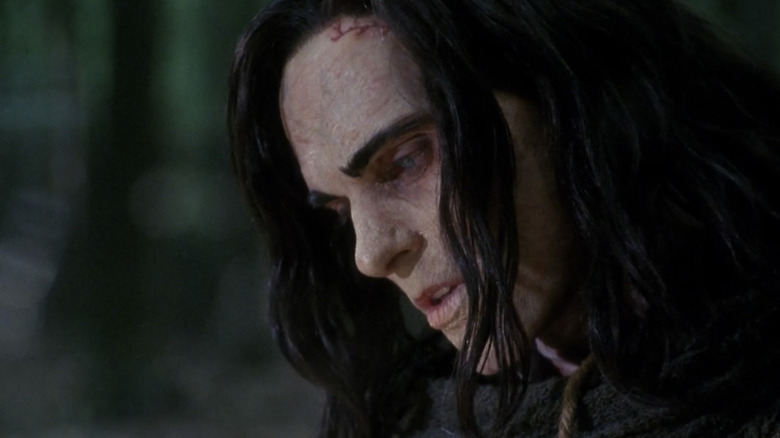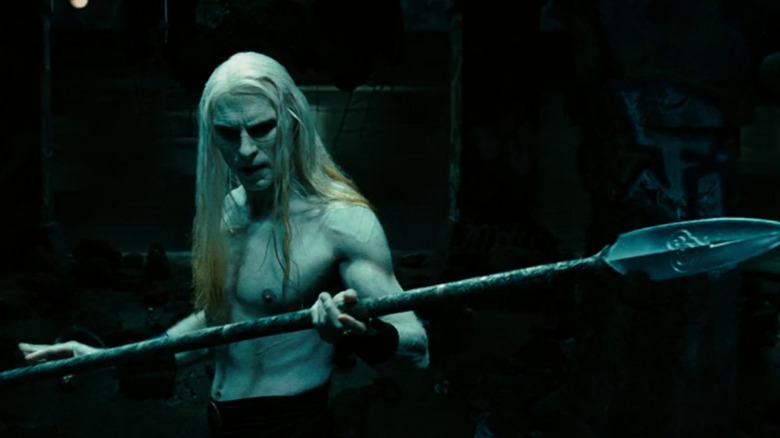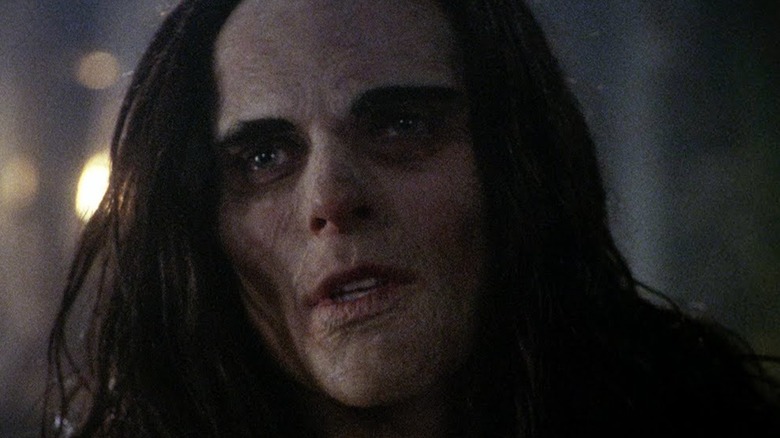A Guillermo Del Toro Movie Star Previously Played Frankenstein's Monster
The many, many "Frankenstein" movies and TV shows are a testament to the enduring power of Mary Shelley's story. She called her novel "The Modern Prometheus," and that daring move has been vindicated, for "Frankenstein" is one of the essential modern myths. And one of the more underrated adaptations of "Frankenstein" is a two-part, three-hour miniseries that aired on the Hallmark Channel (yes, truly) in 2004.
Directed by Kevin Connor, it's one of the most accurate "Frankenstein" adaptations next to Kenneth Branagh's 1994 film. It starred English actor Luke Goss as the Monster, who might be familiar to fans of "Frankenstein" (2025) filmmaker Guillermo del Toro.
Goss appeared in del Toro's "Blade II" as the vampire Jared Nomak, a tragic villain transformed into a new breed of his kind by a "Reaper" virus. Apparently, del Toro got on with Goss enough to cast him again in "Hellboy II: The Golden Army" as the primary villain, Elf Prince Nuada. The Prince wishes to destroy humanity so that the natural and supernatural worlds can retake the Earth from poisonous technology.
One only wonders if, in the many years he's been dreaming of making a "Frankenstein" movie, del Toro ever considered casting Goss as the Monster again. Or, perhaps, if he was peeved the miniseries beat him to it. It worked out well enough, though, given Jacob Elordi's highly-praised, sensitive performance as the Creature in del Toro's "Frankenstein."
As for Goss? He's easily the best part of his "Frankenstein" too. His soft voice reflects the Creature's early innocence, convincing you to empathize with him before he chooses to inspire fear. I'd even say Goss' Creature is the best onscreen version of the character as Shelley wrote him; eloquent, envious, vengeful, and a spurned son who is sympathetic and pitiable but not innocent.
Between Blade II and Hellboy II, Luke Goss played Frankenstein's Monster
The James Whale/Boris Karloff "Frankenstein" films famously made the Creature almost nonverbal and menacing. Compare that to Shelley's book, where he learns to read from "Paradise Lost." Now, del Toro's "Frankenstein" has rewritten the Creature as more sympathetic than ever, leaving out his darkest actions and thoughts from the novel.
Does the miniseries starring Goss measure up to his performance? Not quite. The 2004 "Frankenstein" lacks the best versions' grandeur or gothic mood. On a television budget, the miniseries' cinematography is functional, not artistic. The movie fills out the smallest parts with the biggest actors (Donald Sutherland as the Arctic explorer Robert Walton, William Hurt as Victor's mentor Professor Waldman, and Julie Delpy as Victor's mother Caroline Frankenstein), but their limited roles feel like another symptom of the budget.
The miniseries' narrative fidelity is commendable and an asset, but the greatest pleasure of reading Shelley's book comes from her characters' monologues. In the Hallmark "Frankenstein," her beautiful language is flattened into blunt dialogue: Caroline explaining death to her young son, Victor (Alec Newman) and his love Elizabeth (Nicole Lewis) stargazing and pondering the greatness and evil of humankind, etc.
Speaking of, the romance between Victor and Elizabeth is the one part that does scream "Hallmark movie." This becomes a big problem in episode 1, which keeps cutting between the romantic scenes and the much more compelling storyline of the Creature living unseen among a blind man's family.
A young Dan Stevens makes his onscreen debut as Victor's best friend, Henry Clerval. Watching it, I feel he should've swapped roles: Stevens has shown he can play charismatic but dark characters, making him perfect for Victor, while Newman's weepy Victor would fit better as a supportive best friend character.
Frankenstein (2004) is middling, but Luke Goss' Creature is incredible
Though Goss looks striking as the Creature, the make-up is too subdued. Some barely visible stitching scars or not, he looks like a handsome man with discolored skin, not quite crossing into the uncanny valley. Compare that to Elordi's Creature, who is beautiful yet looks like someone stitched together from different bodies.
Again, though, Goss is excellent as the Creature, commanding your attention in every scene he's in, even as a soft-spoken Monster. The best miniseries-original scenes all center on the Creature. One night, while hiding in the family's barn, he spots the husband and wife having sex through their window. He looks away in disappointment: he's seen love being made and knows he can never have it. In the ending, Walton confronts the Monster for killing his creator: "Christ did not resort to vengeance when mankind sinned against him." The Creature answers, heartbroken, "[Christ's] father loved him."
Yet, this "Frankenstein" does not forgive the Creature as del Toro's film does. "Dr. Frankenstein is the real monster" has become a popular interpretation of the novel. It's one with great merit if "Frankenstein" is read as a story about parenthood and its responsibilities.
A countervailing reading, though, highlights the Creature's murderous entitlement; he doesn't just want acceptance from other people, he demands a woman's love. He looks on the Frankensteins' maid, Justine, with lust and frames her for his own murder of Victor's brother William because she'd never embrace him. He thinks he, as Adam, is owed an Eve by his creator. He deems himself unlovable due to his appearance and embraces violence, like the kind of men we call "incels" nowadays.
I loved del Toro's "Frankenstein" and Elordi's Creature as reinterpretations, but Goss' Monster brings the character of Shelley's prose alive.


